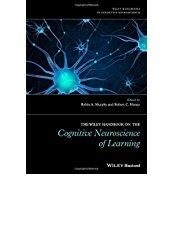Personal Biography
I was raised in Canada where I attended Queen's University for my Bachelor's degree in Psychology. I was drawn towards a central notion in psychology; that behaviour and physiological are markers for complex psychological processes, particularly in relation to our understanding of psychopathologies. This interest led me to a research post in a forensic psychology unit associated with a federal penitentiary where we collected data from inmates for research and therapeutic purposes. These early experiences were fundamental in forming my interest generally in the determinants of behaviour and computational psychopathology . My PhD at McGill University, Montreal completed in 1999 on learning processes was written from the perspective of associative theory and a psychophysics of correlation detection. I came to England while writing my dissertation to take up lectureship posts first at the University of Hertfordshire and then in 2003 at University College, London. I took up my post here in Oxford in 2009. I am Associate Professor in the Department of Experimental Psychology at Oxford and as tutor for Experimental Psychology as well as the Psychology/Philosophy (PP), Psychology/Linguistics (PL) and Biomedical Sciences (BMS) courses at Corpus. I have published some 60 scientific papers and chapters on computational and neurological bases of human and animal learning, most recently on a new Handbook of the Cognitive Neuroscience of Learning writiten and edited with Professor Rob Honey (Cardiff). I have sat on the steering committee of the UK Experimental Psychology Society (EPS) and on the editorial board of its scientific journal (Quarterly Journal of Experimental Psychology) and I regularly review for research councils (e.g., BBSRC and ESRC) and am currently Associate Editor for the Journal of Experimental Psychology: Animal Learning and Cognition.
Research and Teaching
I am interested in how humans and other animals learn. Students who decide to conduct research in my lab can choose from a range of computational and technical domains. My laboratory has a comparative cognitive perspective on the processes determining how the mind and brain learn, both in the context of experience, but also from the neurobiological level. The range of topics and techniques used in my lab includes human cognitive learning and memory using computer-based learning tasks. These involve verbal response measures as well eye-tracking measures, animal conditioning, observational recording of naturalistic behaviours, behavioural neuroscience techniques for localization and identification of brain function, and Functional Magnetic Resonance Imaging (fMRI) for studying brain action during human learning. I also have an interest in the history of causal theory development (e.g., folk causation, history of medicine), specifically on the discrepancy between how we actually learn and how people in the past believed we learn.
My work has received financial support from BBSRC, ESRC and the Wellcome Trust research funds. A lecture on comparative cognition delivered to commemorate the Bicentenary of the publication of Darwin's On the Origin of Species in London is available as a free download on iTunes by using search terms 'Robin Murphy'.
The Department of Experimental Psychology at Oxford offers a wide range of challenging Psychology courses. My role at Corpus is to extend this experience with tutorials designed to challenge and integrate your learning experience. I will be involved in much of your Prelims teaching (1st year) and in Part I (2nd year) on the Behavioural Neuroscience module as well as a Part II option (3rd year) on Learning theory, computational models and their applications to everything from animal learning to causal reasoning with discussions of psychopathologies. My lab is always looking for students who would like to conduct projects in my areas of interest. I am a Fellow of the Higher Education Academy.
Representative Publications
Le Pelley, M.E., Reimers, S.J., Calvini, G., Spears, R., Beesley, T., & Murphy, R.A, (2010). Stereotype formation: Biased by association, Journal of Experimental Psychology: General, 139, 138-161.
Baker, A.G., Baetu, I. & Murphy, R.A. (2009). The difference between propositional accounts and propositional representations. Behavioural Brain Sciences, 32, 199-200.
Murphy, R.A., Mondragon, E. & Murphy, V.A. (2008). Rule learning by rats, Science, 319, 1849-1851.
Msetfi, R., Murphy, R.A. & Simpson, J. & Kronbrot, D. (2005). Depressive realism and outcome density bias in
contingency judgement: Task dependent effects. Journal of Experimental Psychology: General, 134, 10-22.
Murphy, R.A., Mondragon, E., Murphy, V.A., Fouquet, N. & (2004). Temporal order of CSs as a discriminative cue for conditioned responding. Behavioural Processes, 67, 303-311.
Murphy, R.A. & Baker, A.G. (2004). A role for CS-US contingency in Pavlovian conditioning. Journal of Experimental Psychology: Animal Behavior Processes, 30, 229-239.
Murphy, R. A. & Honey, R.C. (Eds.). (2016). Handbook of cognitive neuroscience of learning. London: Wiley.
Byrom, N. & Murphy, R.A. (2018). Individual differences are more than a gene x environment interaction: The role of learning. Journal Experimental Psychology: Animal Learning & Cognition, 44, 36-55.
Murphy, R.A., Byrom, N. & Msetfi, R. M. (2017). The problem with explaining symptoms: The origin of biases in causal processing, European Journal for Person Centered Healthcare, 5, 344-350.
